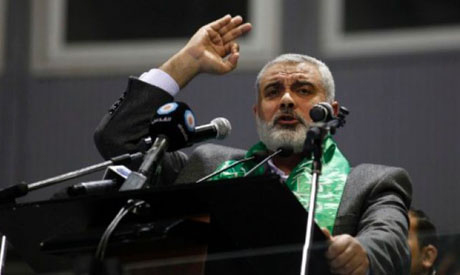
Hamas leader Ismail Haniyeh (Photo: Reuters)
Palestinian Prime Minister Ismail Haniyeh stressed on Thursday that his government has never interfered in the domestic affairs of Egypt.
"We have stances regarding what occurs; however we don't interfere in the internal matters of Arab nations," said Haniyeh during his sermon, which followed the Eid Al-Fitr prayer on Thursday in Gaza.
Following the rise of Islamists to power in post-revolution Egypt and the inauguration of president Mohamed Morsi, rumours about the involvement in Egyptian politics of Palestinians and members of Hamas, which runs the Gaza Strip, became commonplace.
In March Al-Ahram Al-Arabi, an Egyptian state-run weekly, sparked controversy by claiming that three Hamas members were responsible for a deadly attack that killed 16 Egyptian border guards near Rafah in the Sinai Peninsula last August.
The claims were vehemently denied by the Hamas government, which asserted its commitment to protecting Egypt’s security, stressing that Palestinians would never forget the "sacrifices" made by Egypt for the Palestinian cause.
On 26 July, an Egyptian court ordered the detention of deposed president Mohamed Morsi for 15 days pending investigations into his suspected collaboration with Hamas to escape from Wadi Al-Natroun Prison and destroy prison records during the 2011 revolution.
During his sermon, Haniyeh said that all claims of intervention in Egypt by Hamas are rumours and lies. He addressed Egyptians, saying that they will "never see anything but goodness from Palestinians."
Haniyeh further called on Egyptian authorities to re-open the Rafah crossing with Gaza, and to stop demolishing the tunnels on the borders, which through it flows good and medical supplies.
"The tunnels are an exceptional phenomenon, that our people resorted to against the Israeli blockade," said Haniyeh.
Since the ouster of Mohamed Morsi by a new military-backed Egyptian government on 3 July, heavy restrictions have been put in place at the vital crossing.
With rising violence in Sinai, the crossing with the Hamas-controlled Gaza Strip has at times been closed completely.
A recent decision to reduce working hours at the border crossing from nine hours to four has led to a decrease in the number of Palestinians crossing per day to around 150.
Before the new restrictions, the number of people crossing from Gaza was almost 1,200 per day, according to a June statement by Ghazy Hamad, deputy minister of foreign affairs for the Hamas government.
Last Thursday, Hamas’ foreign ministry warned of a possible humanitarian crisis in the Gaza Strip caused by "the closure of the Rafah crossing" and urged Egypt to reopen the crossing to all goods and passengers travelling to the Strip.
Since Morsi’s ouster, the army has also increased its crackdown on tunnels between the Egypt-Gaza border.
On 23 July, a UN official said that almost 80 percent of tunnels used to smuggle goods and arms into the Gaza Strip from Egypt are "no longer functioning" due to the recent campaign.
Short link: